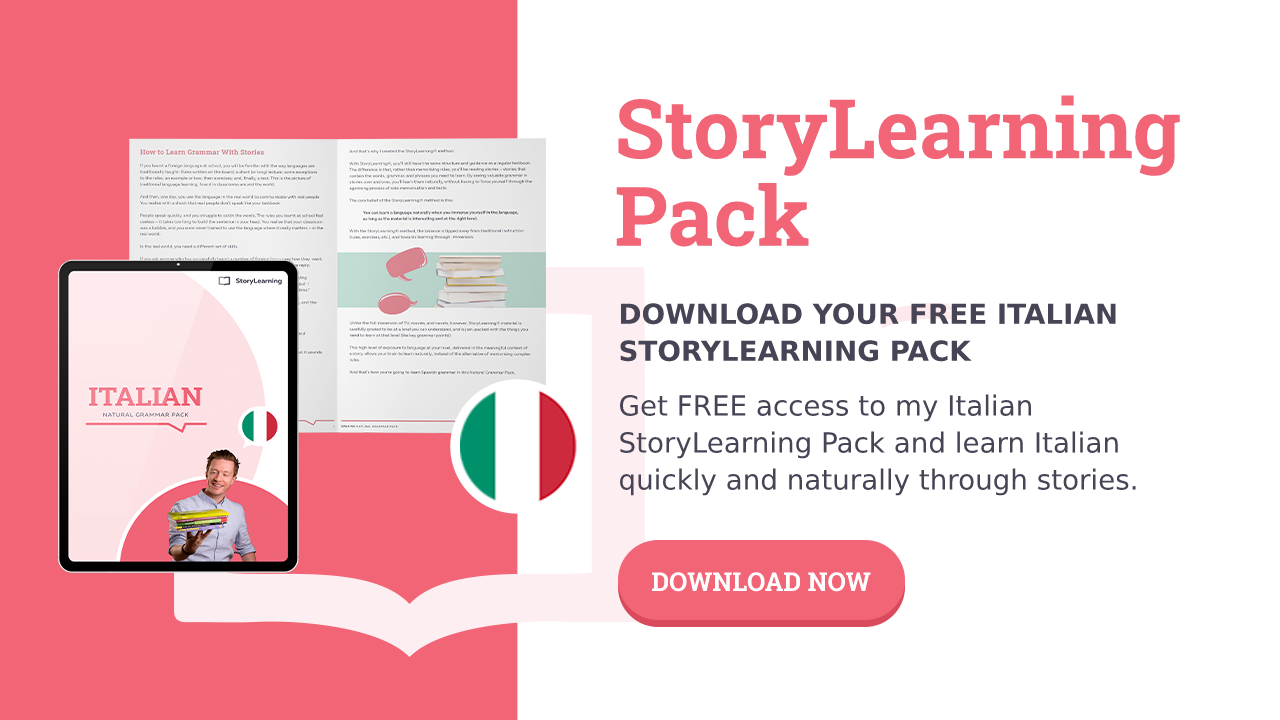
How long does it take to learn Italian? This is a common question among learners and if you're learning Italian or thinking about starting you need to know the answer.
Today, I’m delighted to feature a guest post that answers that common question once and for all.
Here’s what you’ll learn:
- What it means to have ‘basic fluency' in Italian
- Why every learner is different
- 4 key factors that will determine how long it takes you to learn Italian
I hope you enjoy the post!
By the way, if you want to learn Italian quickly and having fun while doing it, I strongly recommend Italian Uncovered, my in-depth online Italian course that teaches you through StoryLearning®. Try out the method for free for 7 days.
Anyway, back to the question at hand… how long does it take to learn Italian?
Over to Dimitris…
Table of Contents
The US Foreign Service Language Institute lists languages and estimates the number of classroom hours required to reach proficiency in each one.
They categorise Italian as a ‘Group One’ or ‘Category One’ language meaning a student would spend nearly 600 hours in the classroom to reach basic fluency.
The Foreign Service Institute (FSI) considers Italian to be one of the easiest languages to learn.
Indeed, it is a lot faster language for monolingual English speakers to learn than for example Russian and Chinese. Russian might take nearly twice as many classroom hours as Italian to reach the same level of fluency.
Under this theory, if you were studying in the classroom for twelve hours a week for 50 weeks, you would reach basic fluency in Italian.
If you went to Italy for an intensive course where you studied 24 hours a week, you would reach basic fluency in just 25 weeks.
While the estimates from the FSI may be helpful to an extent, they are also oversimplifications. There are a lot of other factors that influence how long it will take you to learn Italian.

What Is The Meaning Of ‘Basic Fluency’?
For a start, the FSI figure talks about reaching ‘basic fluency' in 600 hours. But what does ‘basic fluency' actually mean? There is a lot of debate about what we define as fluency in a language.
For the context of this article, let’s say it means that you have a grasp of what’s going on in your surroundings, whether it is in the form of conversations at the table next to you or understanding gist of the TV news and radio news.
It means being able to react accordingly to information you receive and that you can communicate effectively in the language.
Maintaining Fluency Requires Regular Practice
Most importantly, the longer you consistently use a language, the more it sticks in your brain and the more likely you’ll be able to use the language effectively and spontaneously in any encounter years after you began to study it.
If you binge on learning Italian for three months non-stop and then you don’t use it again for years, when you want to speak the language, you will likely have difficulties and not be at the level you were when you stopped your studies.
If on the other hand, you study a few hours per week consistently over the span of many years, you’re likely to reach a high enough level that you won’t lose as much of the language if you were to stop. Inconsistency is one of the language learning villains you'll need to beat to reach Italian fluency.
How I Learnt Italian

Italian was the fourth language I learned after English, Greek and French. I started studying it on my own when I was 17.
I knew that one day I would go visit Italy and use the language to get around the country on my own, so I was really motivated to learn Italian.
At first, I used the language courses that I could borrow from my local library. Then, at university, I used the language laboratory and diligently listened to the collection of Italian materials on reserve there.
So when I finally made my first visit to Italy, at the age of 19, it was exhilarating that I was able to speak to people and make my way around the country.
After my first visit to Italy, I continued to study the language, but less intensively. I took just a couple of more university classes. I continued to visit Italy from time to time and was always happy with my ability to converse and to get by in the language.
Then in 2002, because I was about to begin to work in Italy as a tour leader, I took a conversation class in Italian at a private language school.
Every year since then, I have been returning to Italy to lead at least one tour, if not more. My exposure to the Italian language and culture has been enriched by my work and travels in the country.
So what have my experiences taught me about the amount of time it takes to become fluent in Italian?
How Long Does It Take To Learn Italian: My Experience
If I were to estimate the number of classroom hours I had with Italian, I would say the four formal course that I took would add up to about 90 hours.
Yet the amount of time I’ve been exposed to Italian in my own free time and through professional experience is far beyond the 480 hours of classroom time that the US Foreign Service Language Institute estimates to reach ‘basic fluency.’
Since I didn’t keep a study log in the late 80’s when I began to study Italian, I can only guess at how many hours I spent on my own studying the language before and after my first formal course in Italian.
By the time I set foot in Italy for the first time, I only had taken one formal Italian course, which would have equalled about 30 hours or so of classroom time.
Because I spent time in the language lab on my own, reading and listening to the language regularly, my level of Italian improved steadily.
From my experience, how long it takes to learn Italian is more complicated than simply coming to a set number of hours as per the FSI. There are lots of different factors involved that will affect how long it takes you to learn Italian.
Let’s consider some of those factors so you can see how they influence your learning.

4 Key Factors That Determine: How Long Does It Take To Learn Italian?
#1 How You Approach Italian
How many hours a day will you spend using Italian? The time you spend studying Italian as well as how you use that time will have a big impact on how long it takes you to learn the language.
It’s important to balance your time between the four major language skills:
- Listening
- Speaking
- Reading
- Writing
Keep in mind that a classroom setting is an artificial setting. If you are serious about learning Italian, you need to spend time with the language outside the classroom.
As a beginner, I recommend focusing on at least 15 minutes of each activity (listening, speaking, reading and writing) every day.
It helps if you find material that you enjoy so choose subjects you already have an interest in. Read and listen to this material in Italian as well as in English.
Improve your Italian listening comprehension by listening to Italian talk radio, to Italian news, to Italian comedies, to Italian podcasts, to Italian drama or any other kind of Italian entertainment that you enjoy like Italian YouTube channels.
Most of all, spend time with native Italian speakers participating in their conversations and actively listening to how they express themselves.
Unless you live in an Italian-speaking area or with Italian speakers, you’ll probably need to also set aside time to find people to speak with.
You’ll want to spend time speaking the language and having native Italian speakers provide feedback on your ability to express yourself naturally in their language.
You can do this with language exchanges on apps such as Tandem and Hello Talk, or schedule an appointment with a teacher through websites such as LanguaTalk or italki.
To improve your intonation, consider recording your own voice and playing it back. This is especially effective when you have snippets of audio by a native speaker to compare it with.

Find Italian reading material at your level. If you’re a beginner, I recommend Olly’s book: “Italian Short Stories for Beginners”, which is available in paperback as well as in Kindle format.
Another idea is to use LingQ, which is a language-learning platform and app, full of reading material for all levels.
You can read articles at your level and click new words and phrases to see translations and save them to study later.
Many of the texts allow you to listen at the same time as you read, so you can use LingQ to practice your listening skills as well.
Check out these 24 Italian blogs for more reading inspiration.
In addition to listening, speaking and reading, you’ll want to spend some time writing in Italian.
If you are in a class, your teacher will probably assign homework where you’ll be able to practice your grammar and syntax.
However, as soon as you can, you should go beyond these assignments.
Be curious about the language!
For example, you can write short texts on HiNative and ask native speakers if they sound natural.
HiNative is a website and app that allows you to ask questions about different languages. You can ask questions like:
- How do you say this?
- Does this sound natural?
- Please show me examples with…
- What does this mean?
- What’s the difference?
There is also an open category where you can ask anything you’d like about the language.
Another place to practice your writing in Italian is on lang-8.com where you can write sentences or paragraphs and receive feedback on your writing.

#2 Do You Speak A Romance Language Already?
If you already speak a Romance language, you’re going to learn Italian faster because there are many similarities in vocabulary and structure, with reflexive verbs in Italian for instance.
My advantage was that I was already proficient in French before I began to learn Italian.
If you've already learned French, Spanish, Portuguese, Catalan or Romanian, for example, you will be far ahead of other students without such experience.
If you are already proficient in a Romance language and find yourself in a classroom setting, you may consider pushing yourself by skipping a few levels and jumping right in to a lower intermediate level course.
You’ll struggle at first but with your existing Romance language knowledge, you’ll be able to push ahead and catch up.
This is a great technique for highly motivated language learners. It’s what I did with both Italian and Spanish, rather than taking the course for absolute beginners.
#3 How Confident And Motivated Are You?
- How confident are you that you will learn to speak Italian?
- How motivated are you to learn Italian?
- What are your motivations for learning the language?
Answering these questions is important before you set out to learn Italian because your level of success depends most of all on on your confidence and motivation.
Take a moment to think about what motivates you to learn Italian.
- Do you have a passion for learning Italian?
- What kind of emotions does learning Italian evoke?
- Do you already have an Italian connection?
If it feels like drudgery to study Italian, then you are likely to take longer to learn the language.
It also means you still haven’t found a way to make language-learning fun. If that’s the case, reassess your materials and remember to use things you already enjoy to learn Italian.
If learning Italian makes you feel good and you have fun with it, then you’ll learn faster. (That's why enjoyment is such a big part of the StoryLearning® method).
Take a look at the methods you are using to learn Italian and focus on those that you enjoy the most. If you lose track of time when you study Italian, that’s a good sign.
The number one thing behind your success in learning Italian is your level of motivation. Strong motivation will increase your confidence that you can succeed.

#4 How Much Opportunity Do You Have To Use Italian?
Are you surrounded by Italian every day? Do you have the chance to practice regularly?
If not, it will take you longer to learn the language. If it is important for you to learn Italian as quickly as possible, then you will want to practice your Italian as much as possible.
You will also want to get constructive feedback so that you can improve your grammar and sound more natural as you continue with your Italian learning. This is why a tutor is helpful.
Consider your own schedule and see how can you make more time for learning Italian. Find ways to bring Italian into your everyday routine. Almost anything can be turned into a learning experience if you're determined. Examples include listening to podcasts, watching the news, or even watching Italian movies.
FAQ How Long Does It Take To Learn Italian?
How fast can you learn Italian?
The time it takes to learn Italian depends on your goals, native language, and dedication. With consistent study and practice, basic conversational skills can be achieved in 3-6 months, while fluency may take 1-2 years of regular effort.
Can I learn Italian in 3 months?
You can learn basic Italian in 3 months if you dedicate yourself to daily study and practice. Focus on key vocabulary, simple grammar, and conversational phrases to communicate effectively in everyday situations.
Is it difficult to learn Italian?
Italian is considered relatively easy to learn for English speakers, especially because of its simple pronunciation rules and familiar vocabulary derived from Latin. Consistent practice and exposure to the language will make it easier over time.
Is it easier to learn Spanish or Italian?
Both languages are similar in difficulty for English speakers, but Spanish may have an edge due to its widespread use and resources. However, Italian’s consistent pronunciation and smaller number of verb tenses can make it easier for some learners.
So, How Long Does It Take To Learn Italian?
In conclusion, the answer to how long it takes to learn Italian depends mostly on you.
The FSI estimate that you need 600 classroom hours to reach ‘basic fluency’ is only a guideline and it doesn’t consider other factors that may help you learn Italian with less effort or in a shorter period of time.
To succeed at learning Italian, you need to make sure to build up confidence and motivation, create steady learning habits, engage in interesting material and practice regularly.
As long as you do those things and keep them up, sooner or later, you will learn to speak Italian with confidence and fluency.
Learn Italian Fast, The Natural Way

If learning Italian is on your bucket list, but you're put off by traditional learning methods based on grammar and textbooks, then you're going to love Italian Uncovered.
This Italian course is based on the StoryLearning® method and will help you go from complete beginner to intermediate level, without getting bogged down in grammar and textbooks.
I've based the course on my years of experience learning languages, and my Italian project, where I learned Italian in 3 months, by simply immersing myself in compelling and engaging content.
If you'd like to learn Italian through my immersive, story-based method, try it out for yourself, for free for seven days.
Dimitris is a language enthusiast who began with languages early and never stopped. He has combined his passion for language and culture with travel and has visited all seven continents and more than 100 countries.

Olly Richards
Creator of the StoryLearning® Method
Olly Richards is a renowned polyglot and language learning expert with over 15 years of experience teaching millions through his innovative StoryLearning® method. He is the creator of StoryLearning, one of the world's largest language learning blogs with 500,000+ monthly readers.
Olly has authored 30+ language learning books and courses, including the bestselling "Short Stories" series published by Teach Yourself.
When not developing new teaching methods, Richards practices what he preaches—he speaks 8 languages fluently and continues learning new ones through his own methodology.









































